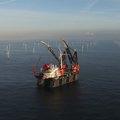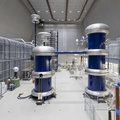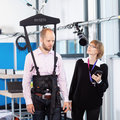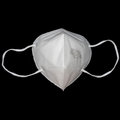Latest News
15 October 2021
TU Delft on board the world largest crane vessel for exploring future Offshore Wind Turbines

How do you install a wind turbine far out at sea when high waves and strong winds make its installation virtually impossible? With this question in mind, a team of researchers from TU Delft, in collaboration with Heerema Marine Contractors (HMC) and DOT B.V., boarded the world's largest crane vessel this week: Heerema's Sleipnir. As part of a major pioneering project, the FOX project, they are exploring floating wind turbine installation.
08 October 2021
TU Delft, Deltares and ProRail to tackle rail subsidence in a structural way

ProRail, TU Delft and Deltares will conduct an investigation over the next five years into the behaviour of trains travelling along our railway embankments. On 4 October 2021, they signed the RESET research programme agreement for this purpose. This research will focus on the consequences of increased and heavier rail traffic along with climate change on our railway embankments and how we can anticipate them. As there is little fundamental systematic knowledge in this field in Europe, this pioneering research may also assist other countries facing similar problems.
07 October 2021
New method helps identifying murder suspects more quickly

Delft PhD student Daan Sutmuller has developed a new, effective method in collaboration with the police that supports homicide investigation teams in collecting and prioritising interesting persons in the investigation more quickly. The promising method should make the investigation work more manageable and ensure that more homicide cases are solved. Sutmuller obtains his doctorate this Thursday with his dissertation 'Murder investigation in the digital age'.
01 October 2021
Diversity & Inclusion Week 4-8 oktober 2021

24 September 2021
TU Delft set to future-proof electricity grid

In order to ensure that the electricity grid is prepared for the future, TU Delft, the Dutch government and partners including grid operator TenneT have joined forces to build a brand-new laboratory: the Electrical Sustainable Power Lab, otherwise known as the ESP Lab. The laboratory – described as a ‘veritable temple of sustainability’ – will be officially opened on the afternoon of Friday, 1 October 2021.
22 September 2021
Understanding human-robot interaction critical in design of rehabilitation systems

Robotic body-weight support (BWS) devices can play a key role in helping people with neurological disorders to improve their walking. The team that developed the advanced body-weight support device RYSEN in 2018 has since gained more fundamental insight in BWS but also concludes that improvement in this field is necessary.
22 September 2021
Now everyone can build battery-free electronic devices

Last year, computer engineers from Delft University of Technology (TU Delft) and Northwestern University introduced the world’s first battery-free Game Boy, which harvests both solar energy and the user’s kinetic energy from button mashing to power an unlimited lifetime of game play. The same team now introduces a new platform that enables makers, hobbyists and novice programmers to build their own battery-free electronic devices that run with intermittent, harvested energy.
21 September 2021
TU Delft opens Climate Action Hub on Campus The Hague

16 September 2021
Position paper: AI as an accelerator of the energy transition

Making a significant contribution to creating opportunities for a CO2-free energy system, this is what 150 representatives from the business community, knowledge institutions and government are working on within the Dutch AI Coalition. The Energy and Sustainability working group collaborated on the position paper 'AI as an accelerator of the energy transition', which sets out the opportunities for a CO2-free energy system. Researchers from TU Delft have made an active contribution to this agenda.
16 September 2021
Delft researchers unmask millions of unsafe face masks

At the request of medical professionals, researchers at TU Delft developed a test method to check whether imported face masks met the safety requirements. And that was necessary, as it turns out, because in total only one-third of the 140 million face masks tested in 19 hospitals passed the safety test.
